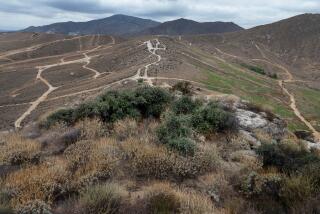Indians Reject Plans for Resort, Park : Development: Tribal leaders, company pushing project don’t plan to give up on selling the concept, which lost by just five votes.
- Share via
Plans to construct a $225-million, 180-acre amusement theme park, water slide park and hotel resort complex on the Viejas Indian Reservation east of El Cajon were rejected by a margin of just five votes, tribal leaders said Friday.
The private company pitching the project had said it would employ 200 persons full time--and thousands during the summer--generate millions of dollars of profit for the Indians, lead to future retail and commercial development and bring sewers, water reclamation and other improvements to the 1,700-acre reservation.
And tribal leaders had argued that the leisure-time project would have been a logical complement to the reservation’s popular bingo, poker casino and trailer campground.
But tribal chairman Anthony Pico said that, despite a series of hearings on the reservation promoting the benefits of the project, a majority of Indians voting on the issue apparently were befuddled by its complexity--including a 99-year land lease to the private firm--and voted against it.
In the final vote, taken Thursday, the project was rejected 54 to 49. Of 180 tribal members, 113 were qualified to vote and 103 did, Pico said.
A secretary for the development company, Gold Springs Enterprises Inc. with offices in Rancho Bernardo, said company officials were braced for the rejection and prepared to push for reconsideration after learning what the opponents’ major concerns were.
“No way are we backing out,” said the woman, who asked not to be identified. “There’s too much involved in this, and we already had planned for this (rejection) as a possibility.”
The project was two years in the planning, Pico said, with Gold Springs officials saying they already had shepherded similar projects in Japan and Europe.
The company wanted to work with the Viejas Indians, Pico said, because it could then sidestep onerous California state regulations.
The project called for a separate amusement park with thrill rides and themed sections based on different periods of American history, from American Indians to the the future; a water slide park with a California Beach Boys theme, and a destination resort hotel, with accompanying restaurant and retail store outlets.
In addition to developing the two amusement parks and hotel, Gold Springs Enterprises would also have purchased about 100 acres of freeway frontage alongside Interstate 8 to be turned over to the Viejas Indians.
Pico said there was virtually no economic risk for the Viejas Indians, but said there was debate about whether the commercial undertaking was conducive to the lifestyle of the reservation.
He said eight public hearings on the reservation were conducted to allay fears and answer questions, and that the hearing seemed to have succeeded in winning over those Indians who attended the hearings.
“We provided them with information on their environmental concerns, water and hydrologic concerns, economic concerns. We provided them with copies of the lease documents, we brought in experts, we did everything.
“Unfortunately, many of those people who voted against the project didn’t come to the public hearings,” he said. “For them, this was still a difficult project to understand.”
Pico said when he learned of the defeat Thursday night, “I was stunned, then I was angry, then I decided I had to go back to work, to find out why the project was not approved, and to work on it so it will be approved.”
Some tribal members said they were concerned that the presence of the development corporation on the reservation would affect tribal sovereignty, and that the project would compromise Indian ethics on the use of their land.
Pico said he didn’t believe philosophical objections to the use of the reservation for such a large commercial project was its downfall.
“The majority of people out here understand we need an economic base--and that won’t come without some impact on where we live,” he said.
More to Read
Sign up for Essential California
The most important California stories and recommendations in your inbox every morning.
You may occasionally receive promotional content from the Los Angeles Times.













